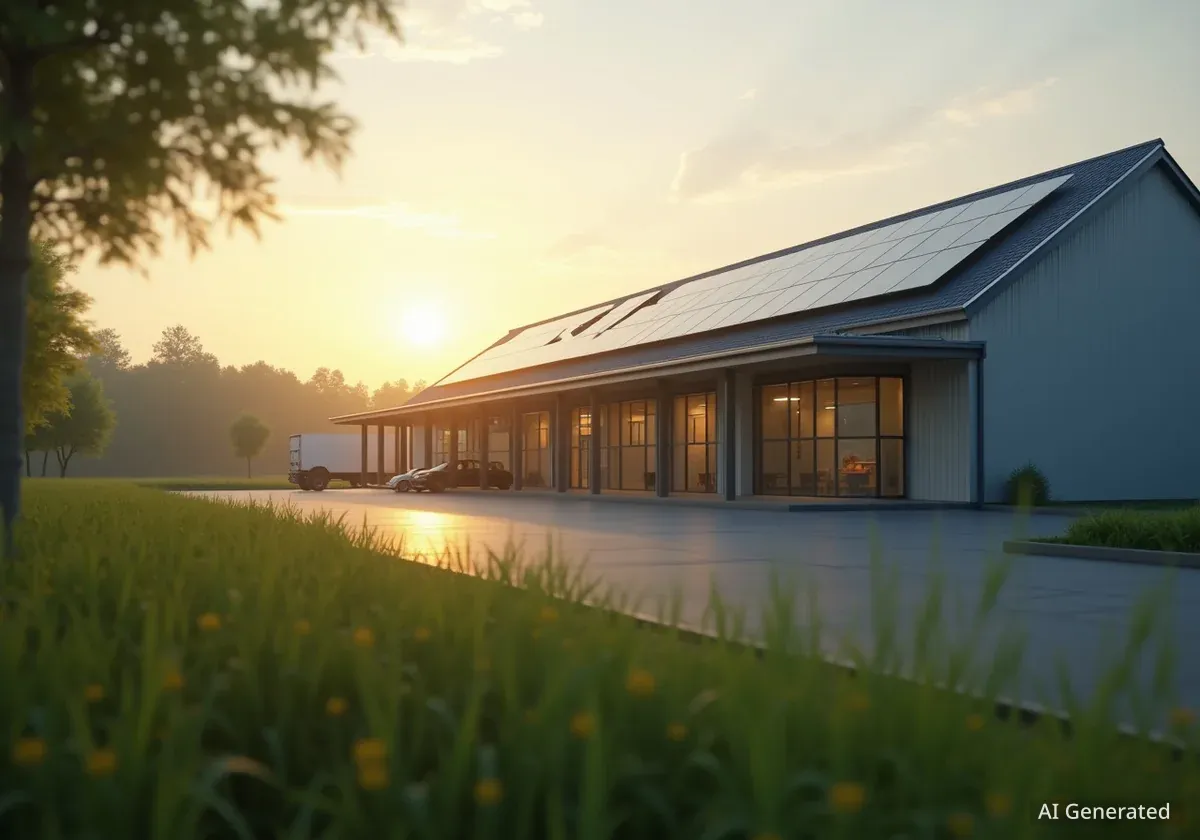Fidelity International has successfully completed the final closing of its Real Estate Logistics Impact Climate Solutions Fund, securing €355 million in equity commitments. The funding round attracted a diverse group of global institutional investors, with Australian superannuation fund Rest participating as a cornerstone investor.
Key Takeaways
- Fidelity International's new fund has raised €355 million to invest in sustainable logistics properties.
- The fund is specifically designed to address climate change by developing and managing energy-efficient real estate.
- Rest, one of Australia's largest superannuation funds, has made a significant commitment as a cornerstone investor.
- The successful fundraising highlights the growing demand from institutional investors for assets that combine financial returns with positive environmental impact.
Fund Exceeds Target with Global Investor Support
Fidelity International announced the final close of its climate-focused real estate fund, which will target investments in the logistics sector across Europe. The fund, named the Fidelity Real Estate Logistics Impact Climate Solutions Fund, has gathered a total of €355 million from institutional investors worldwide.
This capital will be used to acquire, develop, and manage logistics assets that meet high standards of environmental performance. The strategy is designed to create properties that are not only profitable but also contribute to reducing carbon emissions within the supply chain.
The strong interest from a global investor base underscores a significant shift in the investment landscape. More capital is now flowing towards strategies that prioritize sustainability and long-term resilience against climate-related risks.
What is an Impact Fund?
An impact fund is a type of investment vehicle that aims to generate specific beneficial social or environmental effects in addition to financial gains. Unlike traditional funds, impact funds have a dual mandate: they must produce competitive returns while also achieving measurable positive outcomes for society or the planet.
Strategic Focus on Sustainable Logistics
The fund's core mission is to address the urgent need for greener logistics infrastructure. The rise of e-commerce has dramatically increased demand for warehouses and distribution centers, which are traditionally energy-intensive buildings.
Fidelity's strategy involves implementing climate solutions directly into its real estate assets. This approach aims to create a portfolio of properties that are prepared for a low-carbon future and align with the goals of the Paris Agreement.
Investments will focus on projects that can demonstrate a clear path to reducing their environmental footprint. This includes both new developments built to the highest green standards and the retrofitting of existing properties to improve their energy efficiency.
Key Features of Sustainable Logistics Properties
To qualify for investment from the fund, properties will likely need to incorporate a range of climate-friendly features. These technologies and design principles are central to reducing operational carbon emissions. Potential features include:
- On-site renewable energy generation, such as extensive solar panel installations on rooftops.
- Electric vehicle (EV) charging infrastructure for delivery vans and long-haul trucks.
- Advanced energy-efficient building materials and high-performance insulation.
- Smart building management systems to optimize heating, cooling, and lighting.
- Water conservation and recycling systems, including rainwater harvesting.
- Proximity to transportation hubs to reduce final-mile delivery distances and fuel consumption.
The Role of Cornerstone Investor Rest
The participation of Rest as a cornerstone investor is a significant endorsement of the fund's strategy. Rest is one of Australia’s largest profit-to-member superannuation funds, managing the retirement savings of millions of members.
Superannuation funds, similar to pension funds in other countries, have long-term investment horizons. Their involvement signals a belief that sustainable assets are not only ethically responsible but are also likely to deliver superior financial performance over time.
Superannuation Funds and ESG
Australian superannuation funds are increasingly integrating Environmental, Social, and Governance (ESG) criteria into their investment decisions. According to industry reports, a majority of these funds now consider climate risk a critical factor in their portfolio construction, reflecting member demand for responsible investing.
As a cornerstone investor, Rest's early commitment likely helped build momentum and attract other institutional capital to the fund. This type of large-scale, foundational support is crucial for the successful launch of specialized investment vehicles.
Growing Demand for Green Real Estate
The successful closing of Fidelity's fund reflects a broader market trend where both tenants and investors are demanding more sustainable real estate. Companies are under increasing pressure from consumers and regulators to reduce the carbon footprint of their supply chains.
Occupying energy-efficient warehouses can lead to significant operational cost savings for tenants, particularly with rising energy prices. Furthermore, a green-certified building can enhance a company's corporate reputation and help it meet its own sustainability targets.
Market analysts note that properties with strong environmental credentials often command higher rents and retain their value better than conventional buildings, making them attractive long-term investments.
This demand creates a compelling financial case for developing green logistics assets. Investors are recognizing that climate risk is also a financial risk, and portfolios that are not prepared for the transition to a low-carbon economy may underperform in the coming years.
Future of Climate-Conscious Investing
The Fidelity Real Estate Logistics Impact Climate Solutions Fund is part of a new generation of financial products aimed at mobilizing private capital to address climate change. Its focus on a specific, high-impact sector like logistics demonstrates how targeted strategies can make a tangible difference.
The €355 million raised will contribute to the decarbonization of a critical part of the global economy. As more institutional investors allocate capital to similar funds, the development of sustainable infrastructure is expected to accelerate.
This movement is transforming the commercial real estate industry, pushing developers and asset managers to prioritize sustainability not just as an add-on, but as a core component of their business strategy. The success of funds like Fidelity's indicates that profit and purpose are no longer seen as mutually exclusive goals.





